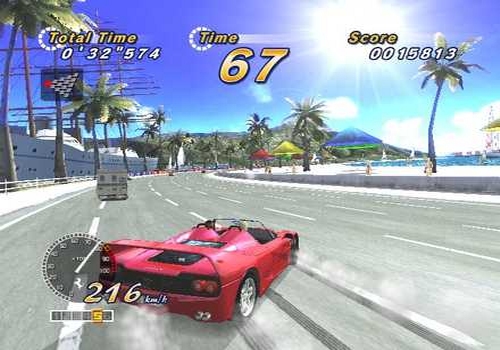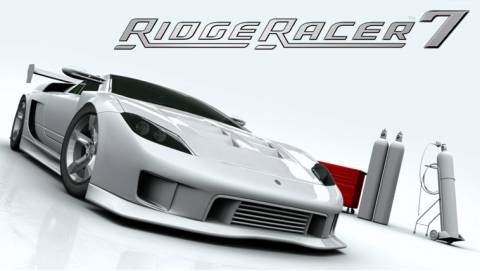Last updated on July 17, 2013
Going to GameStop recently provided a strange experience. I’ve been scoping all my local stores for used game deals. Now, I’m not one to prefer used games in any sense, especially when some mysterious goo (EW EW YOU HAVE NO IDEA) appears on one case/disc or another. Honestly, recent GameStop purchases haven’t required me to use some disinfectant, but who knows. Still, for the deals you get in a New Game System Year, it’s hard to complain when you receive games from dirt cheap two dollar fare to slightly more expensive (and rare) games for ten dollars or so.
Onto the conversation in question: when buying Ridge Racer 7, Namco’s arcade racing series that’s existed in good stead for just about every system generation launch since the Playstation, the employee asked me “Do you like arcade racers?” Somewhat confused by the question, as if this were somehow a bad thing, I answered in the affirmative. Then he made sure to tell me that, when a car hits the wall, it suffers no damage at all and merely stops dead. I said this was a good thing, and I wouldn’t have it any other way. Apparently this was code for “I actually enjoy Japanese game design or something”, because after that he gave me tips for drifting backwards through S curves. Which is awesome and dumb at the exact same time. Am I the only one who thinks that is actually enjoyable?
The game market in the United States certainly changed a great deal since even the PS2 era. Xbox reigns supreme, for better or worse, and game makers capitulated to the American male demographic as soon as Halo showed most every company that they could sell stuff to a larger market. While Wii reigns supreme in system sales, its load of shovelware doesn’t do it any favors in the public eye except as an occasional diversion to what Americans normally do anyway. I think it says something, however, when arcade racers actually need a warning label on them for being “unrealistic”. Least of all do I want an employee of a national chain thinking that I hate arcade racers by them not being realistic!
Seriously, guys, not EVERYTHING needs to be gritty and down-to-earth; that’s probably an American thing, isn’t it? I can deal with my car driving unrealistically, barreling through corners at 150 MPH and ramming into a wall without a single scratch. I don’t need everything to explode, walls to crumble, or lamposts to cease existing while I do it (see Ridge Racer: Unbounded, a fine game that’s not really a Ridge Racer game, far as I can tell). The purity of arcade racing games like Ridge Racer, Outrun, and Sega Rally isn’t to provide you with the most eye-blistering speed and the most destruction EVER. There’s a billion Burnout clones out there, and while I like Burnout, I also like the cleanliness of NOT needing to destroy everything. That element feels so arbitrary and old hat now, doesn’t it? It’s nice to see where I’m going and not need to crash every other car on the raceway.
Is it weird when the car hits the wall and stops dead, even as it looks ultra-realistic on a HD projector? Why yes, yes it does! But that strange suspension of disbelief reminds me that I am playing a game with rules, and that I have failed to take those rules seriously. What would you rather, that the entire race just stop as the car roll a billion times (like in a film car crash) and then explode with me inside it? Being in last place is punishment enough; it’s the clearest indicator of failure, outside of a character outright dying on screen. It’s not muddled or strange, but straightforward. Few games, even indie games, retain this same feel.

The focus of the Japanese arcade racer on speed and mastering drifting/movement mechanics, quite rightly, displays all the reticence in the world to refuse including too many features. Give a player too much to juggle at a time (say, like a nitro speed boost, even if RR7 has it integrated with drifting, or destroying objects or weapons or shortcuts or car damage) and you’ve turned the game into a resource-management fest. Don’t you do that enough when driving in real life? Even Gran Turismo does this, but it must capitulate to capture the home market in any real sense. Its Japanese contemporaries don’t need to do this, really. I’m not down on simulators (because, duh, that’s what they’re meant to do, as in simulate), but I am resistant to people who think you shouldn’t enjoy the bizarro realm where cars don’t show any damage whatsoever. It’s as if the laws of physics suddenly don’t exist, and it requires some pretty heavy suspension of disbelief to get there. Honestly, I don’t care because I’m having fun.
Yes, Ridge Racer includes a “world tour” mode, and so does most Sega Rally games, but each just forces you to play various tracks in different ways with different objectives (which usually all boil down to “race fast”). Master the mechanics and you’re home free; don’t, and the game will try to crush you at every turn. Remember rubber-banding? Or, have you seen recent reviews of every racing game that complain about this? What do you want, the game to play fair? It’s about the challenge and the difficulty, not about whether an AI sits with your expectation of how they should race. It should place it to the wire, where only swift and steady nerves will reign supreme.
In other words, suspending your disbelief means you can pull victory out of nowhere. If Christians have a truly eschatological perspective, I can’t imagine this being a problem. The whole Christian story deals with how things really are versus how they appear to us. From the human perspective, our world’s always in dire straits, we continually perform bad actions to our fellow people, and in the end I will die and go into the ground. However, we believe in a new heaven and a new earth, that God will reform and reshape the world into His ideal image, and bring us along for the ride (Revelations 21):
Then I saw a new heaven and a new earth; for the first heaven and the first earth passed away, and there is no longer any sea. 2 And I saw the holy city, new Jerusalem, coming down out of heaven from God, made ready as a bride adorned for her husband. 3 And I heard a loud voice from the throne, saying, “Behold, the tabernacle of God is among men, and He will dwell among them, and they shall be His people, and God Himself will be among them, 4 and He will wipe away every tear from their eyes; and there will no longer be any death; there will no longer be any mourning, or crying, or pain; the first things have passed away.”
5 And He who sits on the throne said, “Behold, I am making all things new.” And He *said, “Write, for these words are faithful and true.” 6 Then He said to me, “It is done. I am the Alpha and the Omega, the beginning and the end. I will give to the one who thirsts from the spring of the water of life without cost. 7 He who overcomes will inherit these things, and I will be his God and he will be My son. 8 But for the cowardly and unbelieving and abominable and murderers and immoral persons and sorcerers and idolaters and all liars, their part will be in the lake that burns with fire and brimstone, which is the second death.”
Believing in what you cannot see, beyond the realm of empirical evidence, is part and parcel of our faith. It allows us to see past imperfections and sin, viewing exactly what God wants us to see instead: that all things will be made new. Those who think themselves high will be laid low; those who are humble will inherit the earth. It’s completely what we cannot see, yet Christians believe it anyway. You must take a lot on faith…hey, that sounds familiar!
So there’s my counter-intuitive reason for loving arcade racing games and their strange, paradoxical even, juxtaposition of realism and stupidity.

